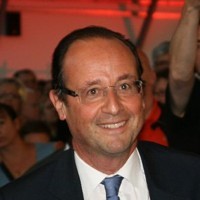When crowds of protesters from Tunis to Cairo ignited what would become the Arab Spring in January 2011, it caught the government of then-French President Nicolas Sarkozy off guard. François Hollande, already campaigning to replace Sarkozy as president, saw an opening in Sarkozy’s initial hesitation and quickly promised to distinguish himself from his opponent’s “silence,” “incoherence” and “contradictory” diplomacy to restore French influence in the region. The demonstrations and uprisings in the Arab world allowed Hollande to draw attention away from the global financial crisis, where Sarkozy had staked his electoral argument for continuity, and toward North Africa, where France had lost both prestige and exports on Sarkozy’s watch.
Now president, Hollande will make his first state visit to an Arab country, Algeria, this December, marking the culmination of his effort to restore France’s standing in a region that is being actively courted by the United States and China. The visit also underscores the differences between Hollande’s approach to regional diplomacy and that of his predecessor.
Five years ago, Sarkozy came to power promising an end to “Françafrique,” shorthand for the cozy postcolonial relations between Paris and autocratic rulers in Northern and sub-Saharan Africa. However, Sarkozy demonstrated little interest in France’s former colonies and had no patience for their demands that Paris apologize and provide reparations for its colonial legacy. He hastily convened a Mediterranean Union under French leadership, but the project lacked clarity of purpose. The proposed union was half aspirational -- it included Israel -- and half realist, with figures such as Egypt’s Hosni Mubarak and Tunisia’s Zine El Abidine Ben Ali playing key roles. Sarkozy soon pivoted away from the Maghreb and invested in bilateral courtship of the Persian Gulf countries instead. After stumbling through the outset of the Arab Spring, he played a high-profile and vocal role in catalyzing support for the NATO intervention in Libya last year.

